Key takeaways:
- Handcrafted goods reflect the artisan’s skill and cultural heritage, offering individuality and a story behind each piece.
- Supporting sustainable brands contributes to environmental conservation, empowers local artisans, and fosters innovation in production practices.
- Ethical purchases create meaningful connections with products and their creators, impacting communities positively and promoting responsible consumer habits.

Understanding handcrafted goods
Handcrafted goods embody a unique charm that mass-produced items often lack. When I first held a beautifully crafted wooden bowl, the intricate details told a story of its maker. It made me wonder, how often do we consider the hands and heart behind the goods we use daily?
Each piece is a labor of love, often reflecting the artisan’s skills and cultural heritage. I remember visiting a local market where an elderly potter shared how each glaze he used was inspired by his childhood memories. That connection to a person’s background adds so much depth, doesn’t it?
The beauty of handcrafted goods lies in their imperfections; they are not just products but expressions of individuality. I often think about how these items carry the energy and passion of their creators. Isn’t it fascinating that a simple mug can hold so much meaning and history?
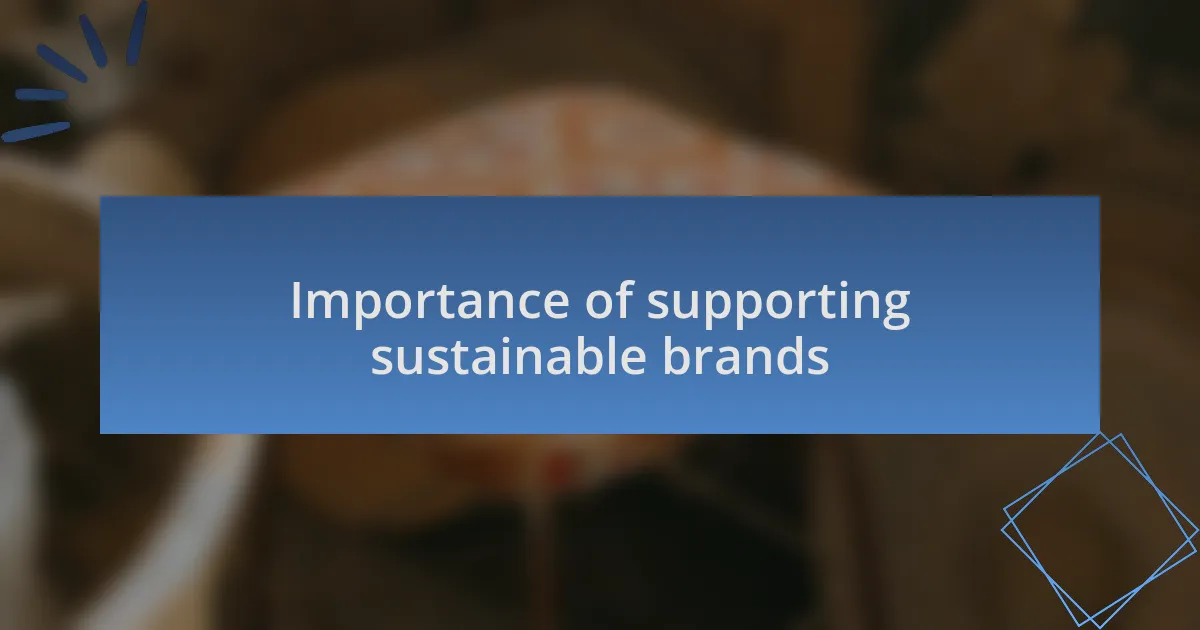
Importance of supporting sustainable brands
Supporting sustainable brands is crucial because it directly contributes to conserving our environment. I remember when I chose to buy an eco-friendly tote bag made from recycled materials instead of plastic. It felt empowering to know that my small choice was helping reduce waste and promote a cleaner planet.
Moreover, investing in sustainable brands often means supporting local artisans and communities. I once met a young woman who started a handmade jewelry business focused on using ethically sourced materials. Listening to her passion for creating opportunities for local craftsmen reminded me that every purchase can spark positive change in someone’s life.
It’s also essential to recognize that sustainable practices foster innovation and creativity. I’ve seen how businesses committed to sustainability explore new ways to minimize their carbon footprints. This drive not only leads to better products but also inspires others to rethink their consumption habits. Why wouldn’t we want to champion that kind of forward-thinking?
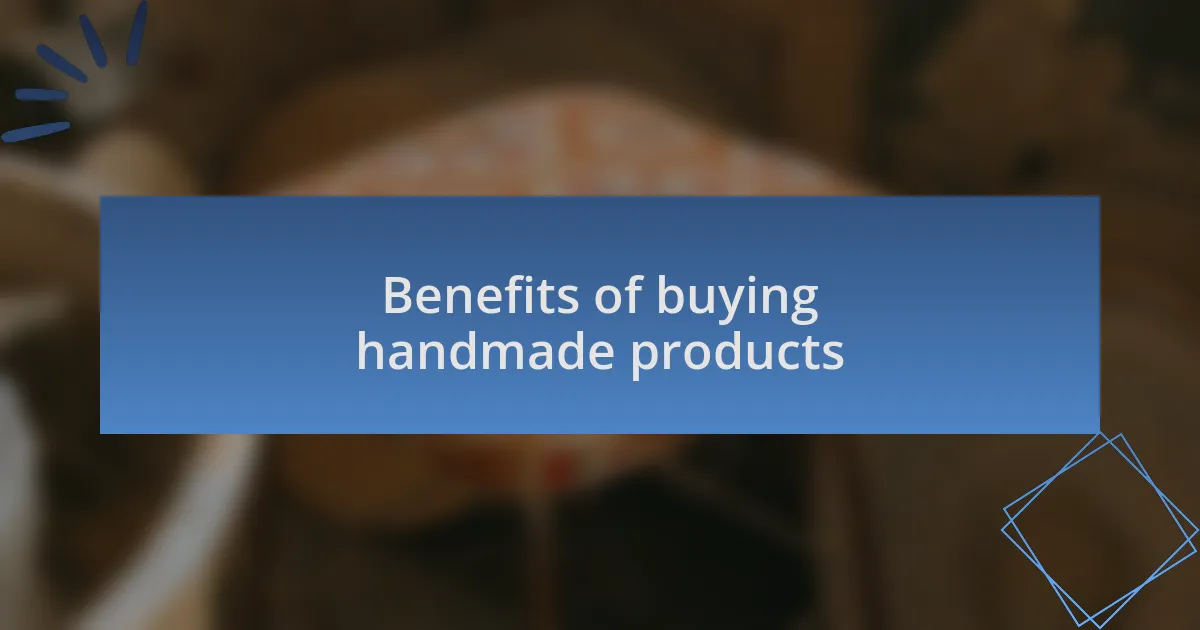
Benefits of buying handmade products
Buying handmade products offers unique charm and individuality that mass-produced items often lack. I still remember the first time I purchased a handwoven basket at a local market. It was unlike anything I had ever seen – each weave told a story. How could I not admire something crafted with such personal care and attention?
Another benefit is the quality that comes with handmade items. Personally, I’ve found that hand-sewn clothing lasts much longer than anything I could buy off the rack. It’s a small investment with significant return – not just for me, but for the skilled hands that created it. Isn’t it rewarding to know that your purchase supports craftsmanship?
Moreover, when I choose handmade, I often feel a deeper connection to the product. Recently, I bought a handmade ceramic mug from a pottery studio. Every morning, holding that mug reminds me of the artist’s dedication and talent. Doesn’t it feel special to drink your coffee from something that embodies someone else’s passion and creativity?
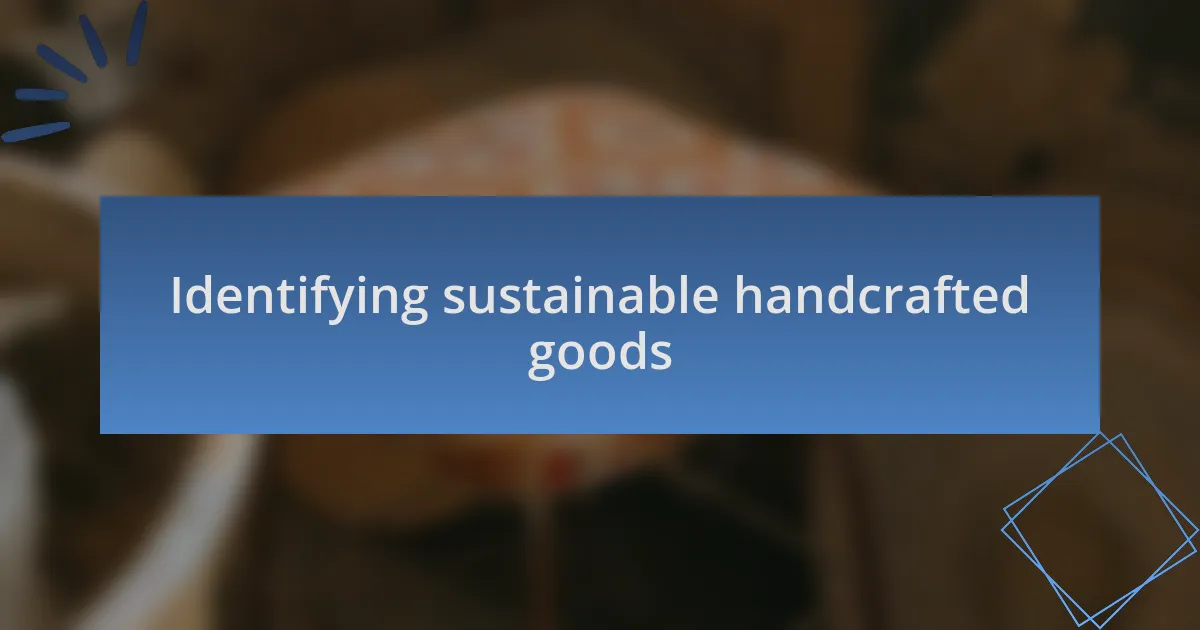
Identifying sustainable handcrafted goods
Identifying sustainable handcrafted goods involves looking for specific qualities that reflect eco-friendly practices. For instance, when I purchase handmade soaps, I make it a point to check for natural ingredients. I once came across a small batch soap maker who used local botanicals, and the scents were pure magic. Doesn’t it feel good to know that what you’re using is free from harmful chemicals and supports local agriculture?
Another indicator of sustainability is the maker’s commitment to their craft. I remember attending a craft fair where an artisan explained how she sources her materials from recycled or upcycled sources. Hearing her passion made me appreciate her work even more. How often do we have the chance to connect with the person behind the product and understand their sustainability efforts firsthand?
Additionally, considering the packaging can be revealing too. Whenever I receive handcrafted items in compostable packaging, I feel reassured about my purchase. For instance, after ordering a hand-poured candle, I was pleasantly surprised when it arrived in recycled materials. How refreshing it is to find a product that prioritizes the planet even in its delivery!

How I chose my brands
When choosing brands, I often reflect on the stories behind the products. I once discovered a jewelry maker who crafted her pieces from reclaimed metals. Each time I wear one of her necklaces, I think about the history of those materials and feel a deeper connection to the art. Isn’t it inspiring to wear something that carries a narrative?
Another major factor for me is the ethics involved in the production process. During my search for ethically sourced textiles, I came across a small workshop that employs local artisans, providing fair wages and supporting their families. This commitment to the community enhances my appreciation for the items I purchase, making them feel more meaningful. How often do we consider the lives of those who create our beloved goods?
Lastly, the transparency surrounding a brand’s practices can sway my decision. I recall visiting a pottery studio where the owner openly shared her efforts to reduce waste through every step of her process. Her honesty and dedication were refreshing and made me eager to support her work. Isn’t it reassuring to back brands that prioritize integrity and sustainability?
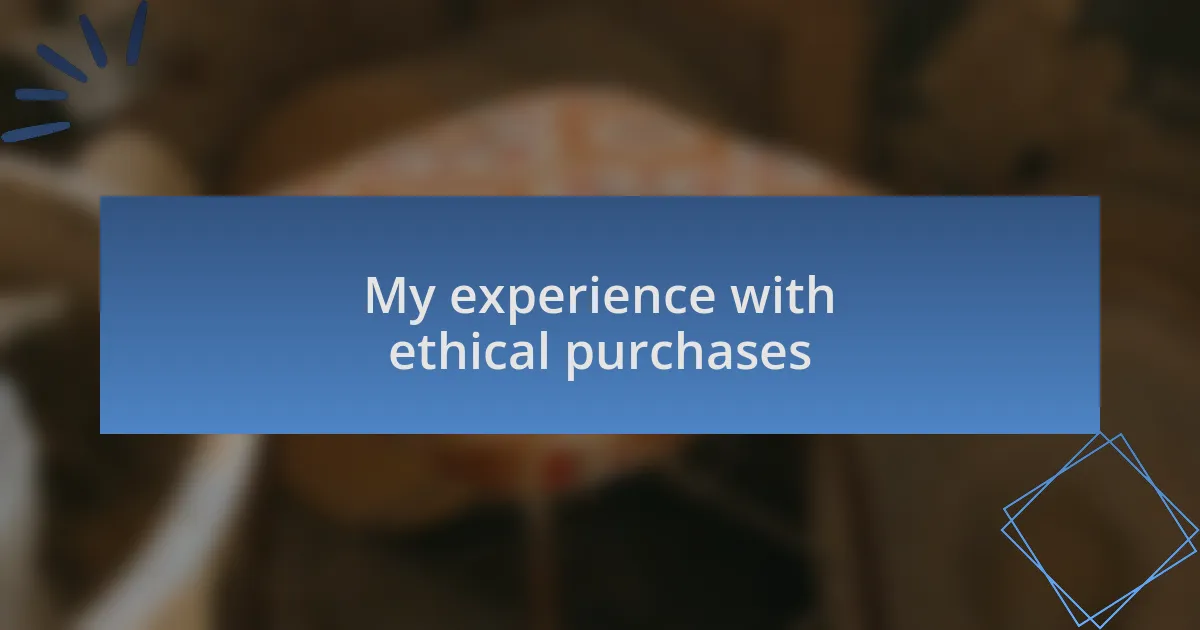
My experience with ethical purchases
My experiences with ethical purchases have always left a significant impact on me. When I started exploring sustainable brands, I stumbled upon a small candle company that used natural ingredients and eco-friendly packaging. The moment I lit one of their candles, I was struck by the rich, pure scents, knowing that my choice directly supported a business dedicated to preserving our planet. Isn’t it fulfilling to indulge in a product that’s not only luxurious but also kind to the earth?
One purchase that stands out in my mind is a handwoven basket from a cooperative that empowers women artisans in a rural community. Each time I use it, I remember the stories shared by the maker, who spoke passionately about how her craft transformed her life. It made me realize that my support could ripple throughout an entire community, changing lives one purchase at a time. How often do we consider the power we hold in our shopping choices?
Engaging with ethical brands has also challenged me to think more critically about my habits. For instance, after buying a set of reusable beeswax wraps, I noticed how much plastic waste I had been generating. It was an eye-opening experience that pushed me to adopt more sustainable practices in my daily life. Hasn’t it ever dawned on you how a single purchase can catalyze a change in our lifestyles?
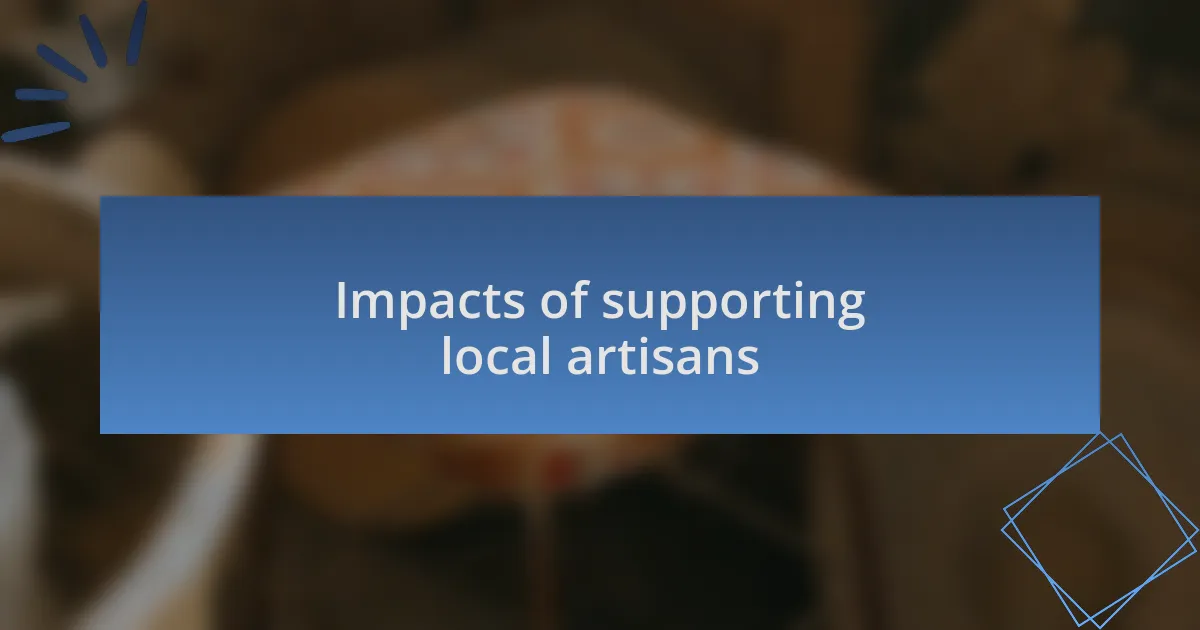
Impacts of supporting local artisans
Supporting local artisans profoundly impacts both the community and the artisans themselves. I remember purchasing a hand-painted ceramic mug from a local potter. Each sip from that mug reminds me of the artistry and creativity it took to make, and knowing that my money went directly to someone who pours their heart into their craft makes every cup feel special. Have you ever considered how your choices could preserve unique cultural traditions?
The empowerment of artisans often leads to tangible change in their communities. I once visited a local market where I met a weaver who started her own cooperative. She shared how her income helped send her children to school, breaking the cycle of poverty in her family. Isn’t it incredible to think that a simple scarf could pave the way for a better future for a child?
Moreover, buying handcrafted items fosters a unique connection between consumers and creators. I reflect on the joy I felt receiving a personalized wooden gift from a local craftsman. Not only was it thoughtfully made, but it also came with a story about his journey and why he began creating. How powerful is it to know that our purchases can foster such connections and support the dreams of talented individuals?